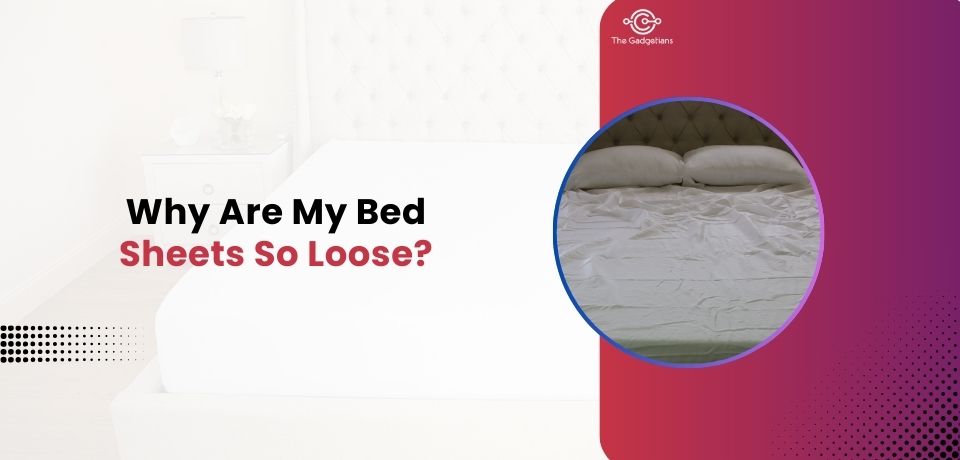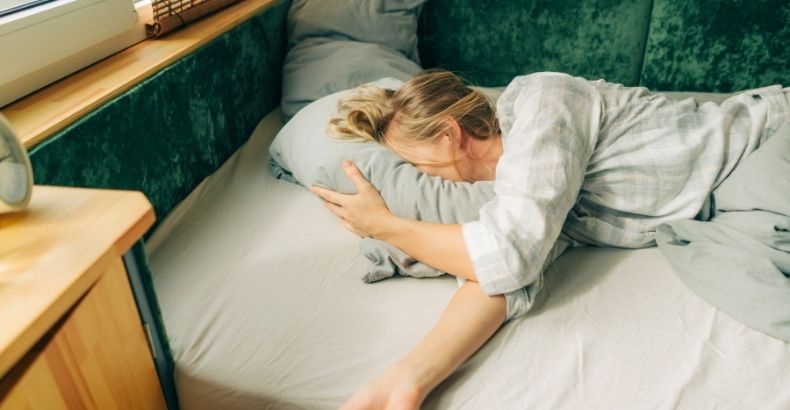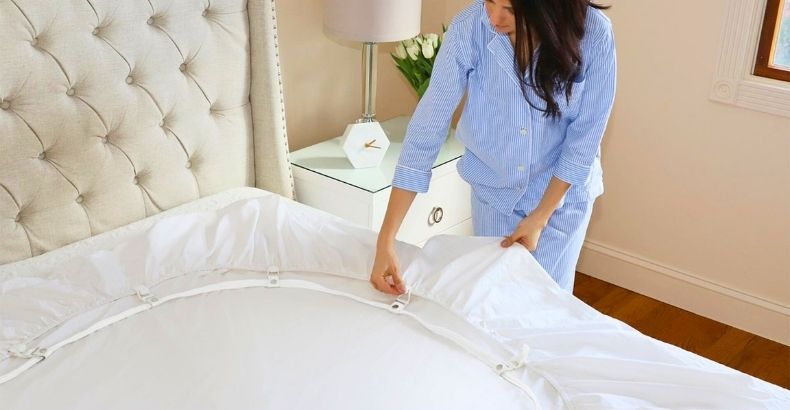A good set of bed sheets is essential for a comfortable night’s sleep, but there’s nothing more frustrating than loose sheets that slip off during the night. If you’ve found yourself wondering, why are my bed sheets so loose, you’re not alone.
Your bed sheets may be loose due to using the wrong size, worn-out elastic, improper tucking, or low-quality fabric. Fortunately, there are simple solutions to ensure your sheets stay in place, such as opting for deeper pocket sheets or using sheet straps.
Throughout this article, we’ll explore why this happens, as well as offer practical solutions to get a snug, cozy bed every night. Keep reading to learn more.
Why Are My Bed Sheets So Loose?
A well-made bed brings comfort and relaxation, but loose bed sheets can be incredibly frustrating. If your sheets constantly slip off, you’re not alone. Let’s explore why this happens and what might be causing the problem:

Incorrect Sheet Size
Using sheets that don’t match your mattress size can cause a loose fit and discomfort. Queen sheets on a full-size bed won’t stay in place, creating lumps and folds. Oversized sheets tend to bunch up, shift, and slide off easily. Always check the label for proper mattress dimensions to ensure a snug fit.
Worn-Out Elastic
Elastic loses its stretch and strength over time due to frequent washing and constant pulling. Weak or stretched-out elastic can’t grip the corners of the mattress tightly. This leads to sheets slipping off during the night, causing disruptions. Regularly inspect your fitted sheet’s corners for loose or damaged elastic.
Thin or Low-Quality Fabric
Cheap, thin fabrics often struggle to hold their shape and grip the mattress. Lightweight sheets made from poor-quality materials are more likely to shift, wrinkle, and bunch up. High-quality fabrics are thicker, more durable, and stay firmly in place. Investing in better fabric can reduce loose sheets and improve comfort.
Improper Tucking Technique
How you tuck in your sheets can greatly impact how well they stay put. Loose or rushed tucking allows sheets to shift easily, especially with movement. Tight, secure tucking helps sheets grip the mattress and stay in place. Taking extra time to smooth and tuck in the sheets can make a big difference.
Mattress Depth Mismatch
Not all sheets are designed for every mattress depth, especially thicker models. Standard sheets won’t properly fit pillow-top or memory foam mattresses. Deep-pocket sheets are made to cover thicker mattresses and stay in place. A mismatch in sheet and mattress depth leads to slipping and discomfort.
Frequent Movement During Sleep
Active sleepers who toss and turn often pull sheets loose. Continuous movement puts pressure on the sheet corners, causing them to pop off. Sheets may shift and come undone overnight, disrupting sleep. Your sleep habits can directly affect how securely your sheets stay on.
Smooth Mattress Surface
Mattresses with smooth or slippery covers make it harder for sheets to grip. Materials like satin or silk toppers reduce friction between the sheet and the mattress. This smooth surface allows sheets to slide off more easily throughout the night. A textured mattress surface can help sheets stay secure.
Shrinkage from Washing
Washing sheets in hot water or drying them on high heat can cause shrinkage. Shrunk sheets won’t properly fit the mattress, causing corners to lift and loosen. This results in loose, ill-fitting sheets that slide off. Always follow care instructions to maintain the proper fit and prevent shrinkage.
Consequences of Using Loose Bed Sheet
A good night’s sleep requires more than a comfortable mattress; properly fitted sheets are essential too. Loose bed sheets may seem harmless, but they can cause various issues. Here are the consequences of using loose bed sheets.

Disrupted Sleep Quality
Loose sheets can shift during the night, creating wrinkles and folds that feel uncomfortable. These disturbances can interrupt your sleep, leaving you tired. Constantly adjusting the sheets disrupts restful sleep cycles, affecting your overall health. Smooth, secure bedding promotes better sleep and relaxation.
Increased Risk of Skin Irritation
Bunched-up sheets can rub against your skin, leading to irritation or discomfort. Wrinkles and folds create pressure points, causing unnecessary strain. People with sensitive skin may experience redness or even rashes. Properly fitted sheets reduce friction and provide a smoother sleeping surface.
Reduced Mattress Longevity
Loose sheets fail to provide adequate protection for your mattress, exposing it to dirt and sweat. This can lead to stains, odors, and damage over time. A poorly protected mattress deteriorates faster, affecting its support and comfort. Fitted sheets stay in place, prolonging the life of your mattress.
Cluttered and Untidy Appearance
A bed with loose sheets looks messy, even if it’s recently made. Untidy bedding can make your entire bedroom feel unorganized. A well-made bed creates a sense of calm and order in your space. Secure sheets contribute to a polished and inviting room.
Increased Household Chores
Constantly adjusting and re-tucking loose sheets adds unnecessary work to your daily routine. You might find yourself remaking the bed often, which can waste valuable time. Additionally, loose sheets tend to collect more dirt, necessitating more frequent washing. To simplify maintenance and reduce these chores, consider the effectiveness of bed sheet straps, which help keep sheets firmly in place.
Risk of Slipping and Falling
Excess fabric hanging from the mattress can create tripping hazards. Children or older adults are particularly at risk of injuries. Loose sheets can also slide off entirely, exposing a slippery mattress surface. Ensuring a snug fit minimizes the chances of accidents in your bedroom.
Does the Type of Mattress Affect How Sheets Fit?
Yes, the type of mattress does affect how sheets fit. Thicker mattresses, like pillow-top, hybrid, or memory foam models, often require deep-pocket sheets to stay secure. Standard sheets may not stretch enough to cover these mattresses properly, causing them to slip off during the night and disrupt sleep.
Firm and thinner mattresses usually hold regular sheets better due to their flatter surface. However, even on firm mattresses, loose-fitting sheets can bunch up, creating discomfort and requiring constant adjustments. Using helpful accessories like a Bed Scrunchie can keep sheets tight and secure, providing a smooth and wrinkle-free sleeping surface.
Adjustable and split mattresses create more challenges for sheet fitting because they move and change shape. Regular sheets can easily pop off when the mattress shifts positions. Choosing stretchy, deep-pocket sheets or adjustable sheet fasteners ensures a snug fit and prevents constant slipping.
How Often Should You Replace Your Bed Sheets to Prevent Issues?
Fresh, clean bed sheets are essential for comfort, hygiene, and a good night’s sleep. Over time, sheets wear out and lose quality. Here’s how often you should replace your bed sheets to avoid common problems.
General Replacement Timeline
Most bed sheets should be replaced every 1–2 years for optimal comfort. Frequent use and washing weaken the fabric over time. Worn-out sheets can become thin, rough, and uncomfortable. Regularly updating your sheets ensures a cozy and restful sleep.
Signs of Wear and Tear
Visible signs like thinning fabric, fading color, and fraying edges signal it’s time for new sheets. Rough texture and small holes also indicate wear. These issues reduce comfort and durability. Replacing damaged sheets improves sleep quality and bedding appearance.
Impact of Washing Frequency
Sheets washed weekly wear out faster than those cleaned less often. Frequent washing causes fabric fibers to weaken and fade. High heat during drying can also damage the material. Using gentle cycles can extend your sheets’ lifespan.
Material Matters
Different fabrics have varying lifespans depending on their quality. Cotton sheets generally last longer than microfiber or linen. Higher thread counts typically offer more durability and softness. Choosing quality materials helps delay the need for replacement.
Allergies and Hygiene
Old sheets can collect dust mites, allergens, and bacteria over time. This buildup can trigger allergies and skin irritation. Regular replacement reduces these risks and promotes better health. Fresh sheets support a cleaner and safer sleep environment.
Seasonal Changes and Comfort
Seasonal shifts affect how comfortable your sheets feel. Heavier fabrics work better in winter, while lighter sheets suit summer. Swapping sheets seasonally prevents excessive wear. Updating bedding based on weather ensures year-round comfort and durability.
What Are the Ways to Fix Loose Bed Sheets?
Loose bed sheets can be frustrating, constantly slipping off and disrupting your sleep. Luckily, there are simple and effective ways to keep them secure. Below are some practical tips for fixing loose bed sheets so you can sleep comfortably.

Use Sheet Straps or Grippers
Sheet straps or grippers tightly hold the corners of your sheets in place. They clip underneath the mattress, preventing sheets from sliding off. Adjustable straps fit any bed size and sheet type. This solution is affordable and easy to use.
Choose Deep Pocket Sheets
Deep pocket sheets are designed for thicker mattresses and stay secure better than standard sheets. They wrap around the mattress more effectively. These sheets prevent corners from slipping off during sleep. Measuring your mattress depth ensures a perfect fit.
Tuck Sheets Properly
Tucking sheets tightly under the mattress creates a snug fit. Hospital corners are a folding method that keeps sheets secure. This technique prevents sheets from bunching or shifting overnight. A well-tucked sheet enhances sleep comfort and appearance.
Try Mattress Toppers
Mattress toppers add texture and grip, helping sheets stay in place. Soft or slick mattresses often cause sheets to slip. Adding a topper increases friction between the sheet and mattress. This simple addition improves sheet security and comfort.
Invest in Quality Fitted Sheets
High-quality fitted sheets with strong elastic provide a tighter, more secure fit on the mattress. Awareness of the importance of fitted sheets helps in choosing ones that grip the mattress firmly and prevent slipping. Strong elastic corners minimize the need for constant readjusting throughout the night. Investing in premium fitted sheets ensures long-lasting comfort, durability, and a consistently neat bed.
Use Non-Slip Rug Pads
Non-slip rug pads placed between the mattress and sheet create friction. Cut the pad to fit the mattress size. This method prevents sheets from sliding off easily. It’s a simple, budget-friendly solution for loose sheets.
Common Questions and Answers
Loose bed sheets are a common frustration for many people, disrupting sleep and causing constant adjustments. If you’re looking for more information on why this happens and how to prevent it, these frequently asked questions provide additional insights and helpful tips to solve the problem.
Does Thread Count Affect Sheet Tightness?
Thread count can impact how sheets grip the mattress. Higher thread counts usually offer more weight and durability, keeping the sheets in place. Lightweight sheets with low thread counts can easily shift and loosen.
Are Bamboo Sheets More Likely to Slip?
Bamboo sheets tend to be softer and more slippery than cotton sheets. Their silky texture can cause them to slide off smooth mattresses. Using sheet straps or mattress toppers can help prevent this issue.
Does Sleeping Position Impact Sheet Fit?
Yes, sleeping positions can affect how tightly sheets stay in place. People who move frequently during sleep may loosen their sheets more than still sleepers. Adjusting sheet types or using grippers can help.
Is It Better to Air Dry or Machine Dry Sheets?
Air drying is gentler on sheet fabric and elastic compared to high heat from dryers. Machine drying on high heat can damage the elastic and shrink the fabric, making sheets fit poorly.
Do Mattress Materials Affect Sheet Grip?
Yes, mattress materials like latex or memory foam can impact how well sheets stay in place. Softer materials allow more movement, causing sheets to shift. Firmer mattresses hold sheets more securely.
Bottom Line
Maintaining properly fitted bed sheets is essential for comfort, hygiene, and quality sleep. Factors like incorrect sheet size, worn-out elastic, low-quality fabric, and improper tucking often lead to loose sheets. If you’ve been wondering, why are my bed sheets so loose, knowing these causes can help you prevent discomfort and disruptions.
Solutions such as using deep-pocket sheets, sheet straps, mattress toppers, or investing in high-quality fitted sheets can make a significant difference. Regularly replacing worn sheets and choosing the right materials also contribute to a better sleep experience. By addressing these issues, you can enjoy a snug, well-made bed that enhances your comfort and promotes restful sleep every night.






